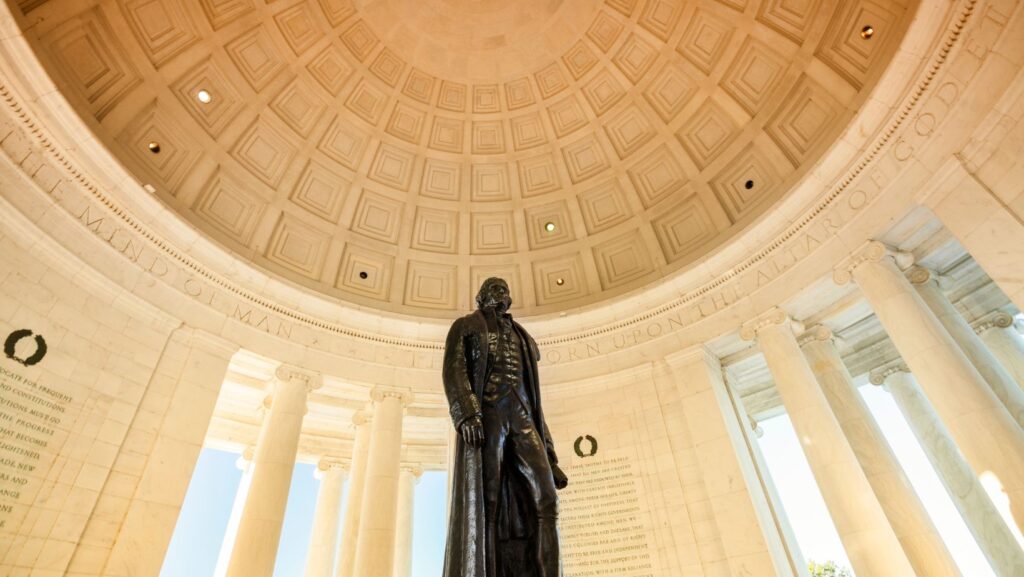
An American Leader Who Supported the French Revolution in the Late 1700s Was
When we think of the leaders who shaped early America, one name that immediately comes to mind is Thomas Jefferson. Known as a Founding Father and the third President of the United States, Jefferson played a pivotal role in shaping American history. However, what many may not realize is that he also had an intriguing connection to the French Revolution in the late 1700s.
During this tumultuous period in France, marked by radical political and social changes, Jefferson found himself drawn to the ideals of liberty and equality espoused by revolutionaries such as Maximilien Robespierre. As an avid supporter of Enlightenment philosophy, it’s no surprise that Jefferson sympathized with those fighting for their rights across the Atlantic.
Jefferson’s admiration for the French Revolution was not merely intellectual; he actively sought to promote its principles back home in America. He believed that revolutions were necessary for society to progress and saw parallels between France’s struggle for freedom and his own fight against British colonial rule. This support would later shape his policies as president and influence his vision for a democratic nation.
In conclusion, Thomas Jefferson’s support for the French Revolution reflects his deep-seated belief in individual liberties and democratic values. By understanding this facet of his life, we gain valuable insights into both Jefferson as a person and his contributions to American history. So let us delve deeper into this fascinating chapter and explore how Jefferson became an American leader who supported the French Revolution in the late 1700s.

Background on the French Revolution
The French Revolution, which took place during the late 1700s, was a period of radical social and political upheaval in France. It was a time when the monarchy faced intense scrutiny and ultimately collapsed, giving rise to new ideas about government and individual rights.
Here’s a breakdown of some key aspects of the French Revolution:
- Causes: The revolution was fueled by various factors including economic inequality, food scarcity, high taxes, and widespread discontent among the lower classes. The influence of Enlightenment thinkers promoting concepts like liberty, equality, and fraternity also played a significant role in shaping revolutionary ideals.
- Phases: The French Revolution can be divided into several distinct phases. The initial phase (1789-1791) saw the abolition of feudal privileges and the creation of a constitutional monarchy. This was followed by more radical phases characterized by increasing violence and instability.
- Reign of Terror: One particularly tumultuous period during the revolution was known as the Reign of Terror (1793-1794). Led by Maximilien Robespierre and his Committee of Public Safety, this phase witnessed mass executions through the use of guillotine as part of an effort to suppress counter-revolutionaries.
- Impact: The French Revolution had far-reaching consequences not only for France but also for Europe as a whole. It inspired other countries to question their own systems of governance and led to major political transformations across the continent.
- Thomas Jefferson’s Support: Thomas Jefferson, one of America’s founding fathers and third President, expressed support for the principles behind the French Revolution even though he did not wholeheartedly endorse its violent methods. He believed that it represented an opportunity for people to assert their rights against oppressive regimes.
Understanding these key points provides us with valuable insights into this pivotal moment in history—the French Revolution—which shaped modern ideas about democracy, human rights, and social justice.
Thomas Jefferson’s early political career was marked by his fervent support for the French Revolution in the late 1700s. As a founding father of the United States, Jefferson played a significant role in shaping the nation’s political landscape.
One of the key milestones in Jefferson’s political journey was his involvement in drafting the Declaration of Independence in 1776. This monumental document outlined the principles and ideals upon which America was founded, including concepts of liberty, equality, and natural rights. Jefferson’s eloquent words and persuasive arguments showcased his deep commitment to democratic values and set him on a path towards leadership.
Following his instrumental contribution to the Declaration, Jefferson embarked on a diplomatic mission to France from 1784 to 1789. During this time, he witnessed firsthand the unrest and revolutionary spirit that engulfed France. Inspired by these events, he became an ardent supporter of the French Revolution, advocating for its principles of popular sovereignty and individual rights.
Upon returning to America, Jefferson continued his political ascent by serving as Secretary of State under President George Washington from 1790 to 1793. In this role, he played a crucial part in shaping American foreign policy while also championing domestic issues such as religious freedom and limited government.
Furthermore, Jefferson’s early career saw him establish himself as an influential leader within the Democratic-Republican Party (later known as the Republican Party). His vision for an agrarian society rooted in individual liberties resonated with many Americans who were wary of concentrated power. This propelled him into becoming one of the most prominent figures during America’s nascent years.
In conclusion, Thomas Jefferson’s early political career laid a strong foundation for his future endeavors as an American leader who supported the French Revolution. From his pivotal role in crafting the Declaration of Independence to his advocacy for democratic values both at home and abroad, Jefferson demonstrated unwavering commitment to principles that still resonate today.












